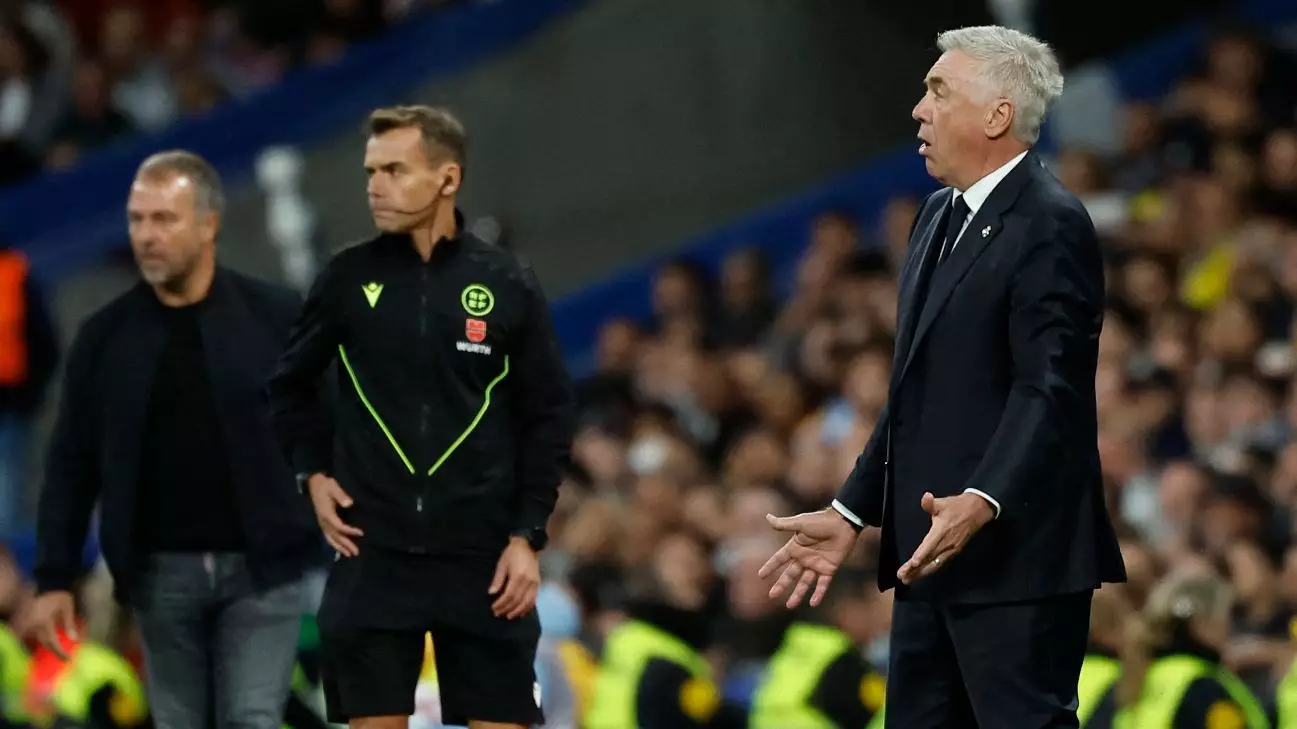The recent El Clásico clash between FC Barcelona and Real Madrid left a profound mark on both teams and their respective fanbases. Held at the iconic Santiago Bernabéu Stadium, the match ended in a resounding 4-0 victory for Barcelona, shaking the very foundations of Madrid’s longstanding dominance in the fixture. For Real Madrid’s coach, Carlo Ancelotti, the pain of this defeat ran deeper than the scoreline; it extended into the realm of sportsmanship and respect. Ancelotti expressed his disdain for the exuberant celebrations displayed by Barcelona’s bench following their fourth goal, especially given that it transpired directly in front of Madrid’s personnel.
While this loss shattered Madrid’s impressive 42-match unbeaten streak in LaLiga, it was also a stark reminder of how quickly dynamics can shift in elite football. Robert Lewandowski, the star performer for Barcelona, netted two goals, complemented by contributions from rising star Lamine Yamal and experienced winger Raphinha. This defeat, more than just a simple scoreline, illustrated a shift in power within Spanish football that could take more than just one match to fully understand.
In Ancelotti’s post-match analysis, the mood was one of mixed reflection. He spoke with a level of dignity about his squad’s first-half performance, implying that the outcome might have been different had they converted their opportunities. “Until the first goal, the game was evenly matched,” he stated, indicating a feeling that luck or a critical moment had swayed the contest. There, in that moment of reflection, lays the crucial element of Madrid’s collapse: a lack of clinical finishing. This scenario played a significant role in eroding team confidence and morale as the match progressed.
Ancelotti’s choice to emphasize team spirit and resilience in the face of adversity will be essential to the coming weeks. With LaLiga’s long season ahead, he appeared reluctant to dismiss the positives of the first half while instinctively recognizing the lessons buried within a devastating 30 minutes. “We can’t throw everything away. We have to learn,” he reiterated, stressing the need for mental fortitude.
One individual who felt the brunt of tactical challenges on the day was Kylian Mbappé. Nurtured on the football fields of Paris, the young superstar found himself ensnared in an offside trap, having two goals dismissed and encountering a striking eight offside calls while struggling to breach Barcelona’s high defensive line. Ancelotti acknowledged the risks associated with pushing Mbappé into such positions but lamented the missed opportunities that could have altered the game’s trajectory.
The statistics reveal a deeper story—Madrid’s 12 total offside calls reflect their struggles against Barcelona’s tactical discipline. As the match wore on and Barcelona took the lead, their confidence surged, transforming the contest into a complete annihilation. Real Madrid’s high-risk approach ultimately played into the corridors of Barcelona’s strengths. Ancelotti’s admission that “the result doesn’t reflect what happened on the pitch” showcases a tension between reality and perception in high-stakes football.
Barcelona’s Rising Confidence and Coach’s Caution
For FC Barcelona, this victory confirmed their growing supremacy this season, emerging just days after their impressive 4-1 dismantling of Bayern Munich in the UEFA Champions League. Under coach Hansi Flick’s leadership, Barcelona have secured 12 wins out of 14 games across all competitions, creating a thrilling momentum. Yet, Flick displayed commendable restraint in celebrating the win too extravagantly. “We are just at the beginning of our journey,” he remarked, full of determination.
His optimism, however anchored in realism, underscores the perils of complacency in football. Barcelona’s new-found confidence, particularly following an emphatic victory against a rival of Madrid’s stature, could either create an upward spiral or foster undue pressure—a double-edged sword for any major club. Flick’s ability to navigate this precarious balance will be pivotal as they strive to maintain this momentum.
As both teams emerge from this intense clash with contrasting emotions, the implications of this match will reverberate throughout the LaLiga season. For Real Madrid, the loss signifies more than a score; it’s a wake-up call to address vulnerabilities and reassess their strategy moving forward. Meanwhile, for Barcelona, the victory serves as a potent reinforcement of their ambitions and the potential lurking in their roster, blending youth and experience.
In the end, football remains a game of moments, strategy, and profound emotional dimensions. The narrative of this El Clásico will not just be remembered for the score—it’s about resilience, tactical evolution, and the layer of human interaction that colors these fierce rivalries. With the season still unfolding, the journey ahead promises more thrills, hurdles, and defining moments for both clubs in their quest for supremacy.


Leave a Reply